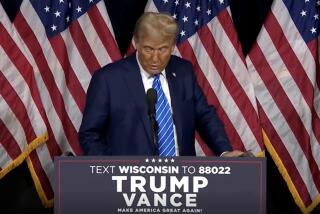White House lawyers aim to scrap the entire Affordable Care Act. One critic says that’s ‘legal nuttery’
Reporting from Washington — The Trump administration is urging a conservative U.S. appeals court to cancel Medicaid coverage for 12 million Americans, insurance subsidies for 10 million more and the protections for 133 million people with preexisting conditions.
But it’s the legal rationale being advanced by the administration that has many raising eyebrows: Justice Department attorneys are claiming that a full repeal of the Affordable Care Act is exactly what the Democratic-controlled Congress of 2010 and the Republican-controlled Congress of 2017 would have wanted.
It’s a legal argument that scholars on the right and left have dismissed as blatantly political. Congress in 2010 voted to pass the law, and lawmakers in 2017 tried but failed to repeal it.
In the past, the Supreme Court has said that if judges decide one provision of a law is unconstitutional, they should “sever” the rest and try to preserve as much as possible— “consistent with Congress’s basic objectives in enacting the statute.”
But Trump administration lawyers took a nearly opposite approach in a legal brief filed this week. They said if one provision of the Affordable Care Act is unconstitutional, the entire law must be voided. The provision in question is the so-called individual mandate requiring Americans to have insurance or pay a fine. It was largely gutted as part of the GOP tax reform bill in 2017, when lawmakers reduced the tax penalty to zero for those who did not buy insurance.
University of Michigan law professor Nicholas Bagley said the legal argument is extreme. “This is not a ‘well, reasonable minds can disagree’ position. It’s legal nuttery and nakedly partisan. Not a single reputable lawyer — of any political stripe — has endorsed it,” he said.
He said the legal claim reflects poorly on Atty. Gen. William Barr. “Part of the job of attorney general includes pushing back on the White House. But in one of his first acts, he agreed to double down” to support the White House attack on the Affordable Care Act, he said.
Justice Department officials did not respond to a request for comment.
In late March, a month after Barr was sworn in, the Justice Department announced in a two-sentence letter that it was changing its position in a pending Texas case. Previously, the administration said it agreed that only the insurance protections should be struck down.
But this week, administration lawyers explained in a 50-page brief that “an inquiry into legislative intent” shows that the entire healthcare law and all its provisions should be voided, including the expanded Medicaid coverage.
They did so even though the Supreme Court has twice upheld the law and Congress under Republican control tried but failed to repeal it.
Administration lawyers theorized that the law may be unconstitutional because Congress in 2017 ended the tax penalty for those who do not buy insurance. They said Democrats in 2010 had described this provision as essential. They then asserted that this feature could not be “severed” from the law, so all of it must go.
“A court’s fundamental task is to ask which of several alternatives adheres more closely to Congress’ original objective,” they said, concluding that this means “the remaining provisions of the ACA should not be allowed to remain in effect.”
But no Congress has voted to repeal the insurance protections for people with preexisting conditions or those on Medicaid. And the original objective of the law was to expand insurance coverage and make it more affordable.
“This is a bizarre construction of legislative intent. The clearest evidence of congressional intent is what Congress did. And in 2017, Congress zeroed out the [individual mandate penalty] tax and did nothing more,” said Jonathan Adler, a law professor at Case Western in Cleveland.
Adler is a conservative who argued in 2012 that the mandate to buy insurance was unconstitutional. But he has been an outspoken critic of the latest legal attacks on the law.
“This is beyond audacious,” he said. “I have talked to current and former Justice Department people, some of whom are quite conservative, and they are very upset to see the department put its name on this brief.”
In 2010, the House and Senate under Democratic control passed the law and expanded healthcare coverage for more than 20 million people through a combination of subsidies. The law included a provision that required all those who could afford it to have basic insurance or pay a tax.
The mandate became the focus of legal attacks, but in 2012 the Supreme Court upheld the law in a 5-4 decision. Chief Justice John G. Roberts Jr. said the tax penalty was constitutional because it was not a “legal command” but gave people a choice: Buy insurance or pay a tax.
Later that year, President Obama was reelected. In 2016, however, Donald Trump won election after promising repeatedly to “repeal and replace” Obamacare. Though Republicans controlled the House and Senate, they did not repeal the law. In July of 2017, one repeal effort famously failed when GOP Sen. John McCain walked on to the Senate floor and gave a thumbs-down signal.
Last year, Texas Atty. Gen. Ken Paxton joined with 20 other states to file a new suit in a federal court in Fort Worth seeking again to strike down the law. “Congress meant for the individual mandate to be the centerpiece of Obamacare. Without the constitutional justification for the centerpiece, the law must go down,” Paxton said. “Obamacare is a failed social experiment. The sooner it is invalidated, the better.”
Supporters of Obamacare had initially thought the mandate to have insurance was crucial to the success of the law. More recently, however, they realized that subsidies, not the mandate, persuaded millions to buy coverage, and the repeal of the tax penalty has had little impact.
Paxton’s suit went before a reliably conservative judge in Fort Worth. The Justice Department initially refused to defend the law.
In December, U.S. District Judge Reed O’Connor agreed with the Texas lawyers and decided the entirety of the law was unconstitutional.
And now, Trump administration lawyers decided to go further and argue that the courts should void the law that the Republican Congress was unable to repeal.
California Atty. Gen. Xavier Becerra and U.S. House Democrats have stepped forward to defend the law in the 5th Circuit Court of Appeals in New Orleans. The appeals court, which has five Trump appointees, said it will hear arguments in the case of Texas vs. United States in early July.
More stories from David G. Savage »
More to Read
Get the L.A. Times Politics newsletter
Deeply reported insights into legislation, politics and policy from Sacramento, Washington and beyond. In your inbox three times per week.
You may occasionally receive promotional content from the Los Angeles Times.











